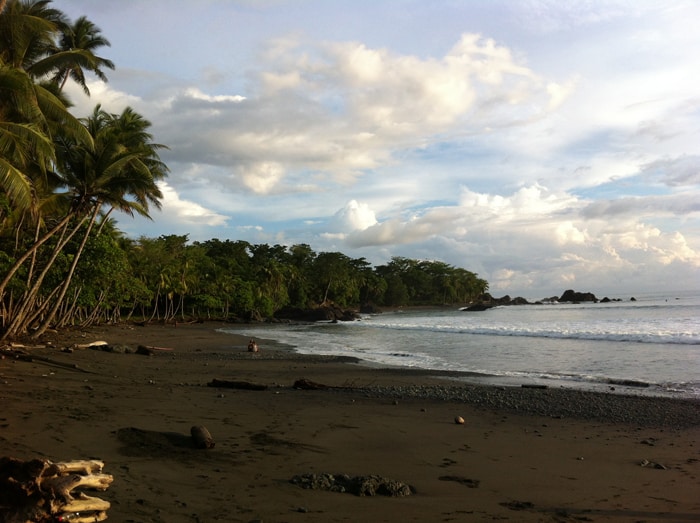PAVONES, Puntarenas – The sick, old man is sitting up sideways in his net hammock draped in front of the Pacific when he hears the news. Pale scars and red scabs cover his legs, while days-old dirt is caked to his bare feet.
When he is told “The King” is returning to take back the land he once owned, his eyes wander toward the distance, as if hunting for some escape, before lapsing into a look of resignation.
“There’s a war coming,” he says. “And it’s going to be even worse than before.”
All around him on this humid February morning lie empty vessels. Piles of dusty beer and liquor bottles, a boat without a motor, a television with a broken screen, and the skeletons of two decayed buildings mar what would be a beautiful plot of beachfront property lined with green palm leaves.
Carlos Lobo, an otherwise destitute 66-year-old with high blood pressure, is the owner of all this sought-after rubble. He survived a war for it. Invasive squatters armed with guns and machetes tried to kill him over this and other land he was protecting while the King was away.
Here on the southwestern edge of Costa Rica, 350 kilometers from the capital, where the dirt roads run into the hills of Panama, the tiny fishing village of Pavones has seen its share of trouble.
Now, 30 years after Pavones’ bloody squatter wars began, in which three men were killed over land disputes, a different type of tidal wave could be swelling up to come crashing down on coveted Pavones properties like the one Lobo sits on now.
Lobo has learned that one Daniel James Fowlie, known here as “The King of Pavones,” is coming back after a three-decade hiatus and that he intends to take back all the land that was once his. In the 1970s and ’80s, Fowlie owned most of the properties in the town, including all of it along the 24-kilometer shoreline running from north of Pavones to Punta Banco, south of town.
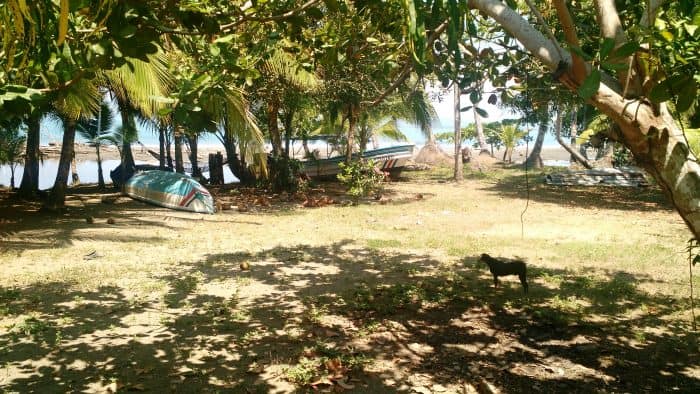
When Fowlie disappeared in 1985 – the year that U.S. authorities raided his ranch in California – for what most assumed would be forever, a battle for his land ensued immediately. Squatters came by the busload, while former associates and workers of Fowlie’s usurped his land through loopholes in the country’s corporation laws.
Once a close confidant of Fowlie, Lobo has come into a strange inheritance of this 12.5-hectare stretch of beach that he says he won in a court battle in the municipality of Golfito against Fowlie’s son, as well as a 39-hectare farm above the beach in the eastern hills. Because Fowlie had been gone for so long, and Lobo was the only one consistently occupying and looking over the land, he says it was legally turned over to him.
In 1991, Fowlie was convicted in the U.S. of running a large marijuana smuggling ring that ran from northern Mexico to the southwestern United States. He was given a 30-year prison sentence and served 18 years – three in a Mexican prison and 15 in a U.S. prison – before his release in 2005. At the time of his arrest, the U.S. government claimed Fowlie was linked to the infamous Mexican drug kingpin Rafael Caro Quintero. Fowlie claims the two shared only the same pilot, and the connection ended there.
Now that Fowlie is set to return to Costa Rica, Lobo says he might finally abandon the land he nearly died trying to preserve.
“If Danny is going to come and try to recuperate everything, I don’t want to be here,” Lobo says. “I’d be better off leaving.”
The rumors, which in Pavones seem as numerous as the grains of sand on the disputed beach, say that Lobo was involved in Fowlie’s drug smuggling enterprise. Though most everyone, including the DEA, agree that Fowlie wasn’t running drugs through Pavones, fingers ended up pointed at Lobo. Police once raided his property dressed as campesinos, he says, and arrested him when they found more than a dozen guns lying around.
They said that Lobo was involved in Fowlie’s illicit affairs and that he would travel with him to Mexico as part of the lucrative side operation. Lobo says he went one time but never had any suspicion that Fowlie was involved in drug smuggling.
“People talk a lot,” Lobo says. “But I didn’t see anything.”
Soon Lobo’s family abandoned him, with his children moving to other parts of the country to avoid the violence. They still help out by paying the bills and sending money for groceries because Lobo has no income. He would fish to support himself, he says, but the squatters stole his boat’s motor.
There’s another rumor going around town about the reclusive Lobo. They say he was one of the last people loyal to Fowlie, and he watched over land that Fowlie left behind in anticipation that he’d be rewarded for protecting it upon Fowlie’s return. People in town say that when Fowlie came back in 2005 after he was released from prison, and after Lobo had spent decades guarding the property from squatters and the mysterious figures backing them, Fowlie demanded his land back without even a thank-you. They call Lobo crazy, obsessive and lonely. Was it worth it, they wonder aloud, to lose everything just to protect this land?
Lobo just shakes his head.
“People talk a lot,” he mutters, his eyes still lost to the distance.
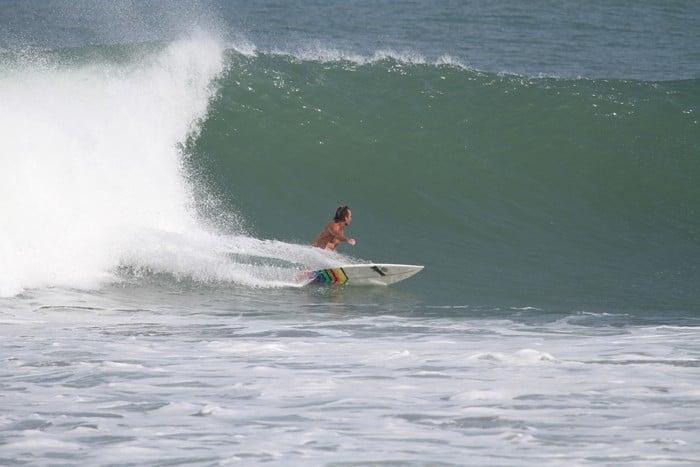
The best left in the world
It was the wave that brought them all here. That machine-like, left surf break pulsates with an unstoppable rhythm, providing the siren call for surfers looking to ride its once untouched waters, along with high-minded investors hoping to strike gold with developments on the gorgeous shore.
The wave stretches for nearly a kilometer, making it the second-longest left break on the planet. It’s so long that they say you should hail a taxi onshore to get back in line for surfing it again. To see it as it swirls at such a consistent pace is to understand the timeless force that attracted Fowlie to buy up all the land in sight in the 1970s.
“It happens to be the best left surf break in the world,” Fowlie said in a February interview with The Tico Times. “There isn’t a left that’s better than that.”
Fowlie, now 82, is still quick to deny his involvement in drug trafficking. He claims to have come to Pavones as a 41-year-old surfer who made his millions selling women’s handbags. When he decided to buy up the Pavones shoreline, he started with a 100-hectare farm that belonged to Cullo Lobo, Carlos’ now-deceased father. He paid $30,000, including a $10,000 deposit in cash that Fowlie said he had in his pocket when he met the elder Lobo.
In the following years, he would come into possession of the original titles on 14 farms covering about 80 percent of town. But instead of buying plots and walling himself off from the community, Fowlie essentially built the town by installing roads, a sewer system, a school and agricultural industries. While the central government and nearby municipality of Golfito had overlooked the poor fishing village, it was the injection of Fowlie’s money that gave people jobs and basic necessities.
Fowlie is such a larger-than-life, Robin Hood-like figure that according to legend, or more precisely a quote from Fowlie’s former attorney, Fowlie once flew a prop plane over Pavones and threw out cash to the people below. When asked about the rumor, Fowlie laughed and said it was just another ridiculous tall tale.
Right in front of where the wave breaks was the famous cantina, Esquina del Mar, that Fowlie built. Before he left he put Francisco “Chico” Gómez in charge of the bar, and during Fowlie’s extended absence, Gómez came into ownership of the land where the cantina used to be before it burned to the ground, on the bend near the soccer field that Fowlie also built.
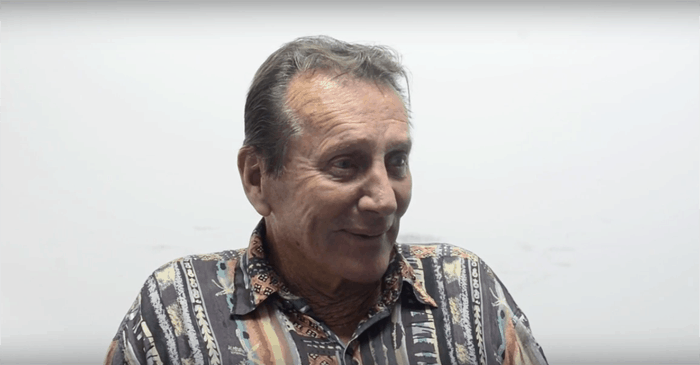
Just like Carlos Lobo, Gómez was a former worker of Fowlie’s now at odds with his old boss. Fowlie said Gómez stole the land from him by going to the municipality while he was in prison and forging a new title. Gómez has since sold the property concession to Houston, Texas-based investor Samuel Claiborn, he said, but he denies Fowlie’s assertion that there was anything illegal about the sale.
Gómez said he went through a trial at the Agrarian Civil Court in nearby Ciudad Neily, where a judge awarded him the property.
“They gave me the rights over the land with the title,” Gómez said. “That’s why he says that I robbed him. I didn’t rob him; I did what the law and government permit and that’s why he’s upset with me.”
Gómez also came into the possession of another large plot that formerly belonged to Fowlie, located between two cell towers out of sight of the coast. He said that before he came to own it the property belonged to Alan Nelson, a childhood friend and longtime associate of Fowlie’s. Nelson’s name was listed in many of the anonymous corporations, known in Costa Rica as sociedad anónimas, or S.A.s, which essentially function to separate a legal bind between capital and the owner.
“[Nelson] said that because I had been taking care of those properties for so long, and since I was fending off squatters and everything, he saw all the effort I put into conserving that piece of land and he gave me the right to it,” Gómez said.
Fowlie denies that he ever gave power of attorney to Nelson – a key question in tracing how all of Pavones ended up in different hands.
The number of properties that Fowlie had under separate corporations is dizzying and nearly impossible to track. His lawyer, Franklin Morera, said that since 2005, Fowlie and his Parque Pavones group have filed about 150 lawsuits against current landowners and corporations all over town.
There is perhaps no plot of land more desired and crucial to the future of Pavones than the one in front of where the wave begins at the center of town. Not surprisingly, Fowlie claims that is his, too. Claiborn and his team are building a controversial condo development there called Pavones Point that some locals have alleged is polluting the area and giving nothing back to the community’s economy.
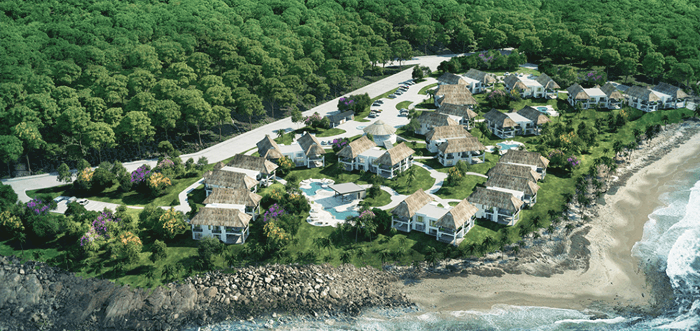
Mauricio Martínez, a lawyer representing Claiborn and Pavones Point, said his legal team began acquiring the property in 1995 by resolving five separate claims to it, although he says none of it belonged to Fowlie. To his knowledge, he added, Fowlie has never filed a request to the municipality for the property, nor has he filed a lawsuit against Baja Navarra, the anonymous corporation headed by Claiborn that was awarded a concession in 2001.
“What really bothers me is that someone who is completely ignorant of the law begins to publicly declare that certain lands are his when he should know that the Maritime Zone Law makes it belong to the state,” Martínez said of Fowlie.
When someone told Fowlie that a third party had bought the property from Gómez and intended to sell it to Claiborn, he called the then-owner and told him Gómez had no right to sell it.
“I don’t know how you’re involved in that, but that’s an illegal piece of property,” Fowlie said to him. “I bought that in 1976 and it was titled all the way to the water. … You bought it from Chico Gómez, who never owned anything in his life.”
Fowlie claims the property was sold without his consent while he was in prison. Later, he says he was unable to contest the sale because he was barred from the country after the Costa Rican government declared him persona non grata from 2005-2016. It would take a ruling from Inter-American Court of Human Rights to allow him back into Costa Rica last January.
Martínez disagreed with Fowlie’s assertion that he has the right to all of his former properties in Pavones, blaming Fowlie for the manner in which the S.A.s holding property ownership were established.
“The big error is that … none of the properties are in his name,” Martínez said. “He made I don’t know how many corporations, and each corporation had properties. The second error was that he changed the corporations’ directors and put people in charge with powers of attorney.”
Fowlie’s trump card, he and Morera claim, is that he has the original deed to the Pavones Point property. Martínez thinks Fowlie is bluffing.
“If he says he’s got the title, then show me the title,” Martínez said. “If he has a legal title over this, then it’s all his.”
After spending a month in the U.S., Fowlie again returned to Costa Rica last week as residents of his former town waited to see whether or not he has the paperwork he claims.
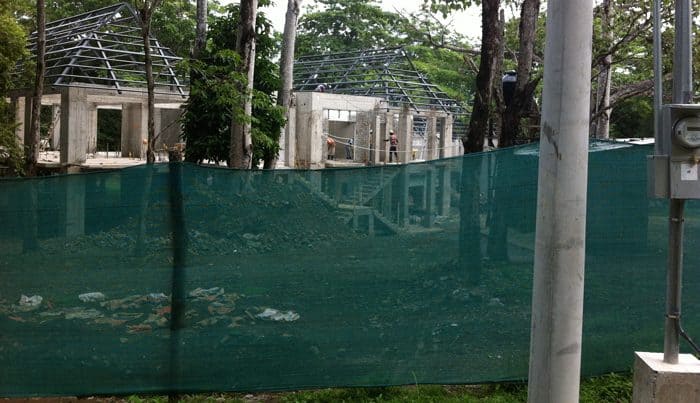
The 30-year war
A pair of vultures circle in complete silence over the Río Claro that cuts through the middle of Pavones. They twirl through the rays of sun before they disappear among the cover of brush.
Twenty-five years ago, squatter Hugo Vargas was shot and killed by the bridge over Río Claro, adjacent to where Pavones Point is now being built. His death, honored by a monument in town, was the first casualty in the squatter wars. Locals say he tried to invade a Gringo surfer’s property and the caretaker shot him.
Just three years before that, the Rancho del Mar property that was Fowlie’s major finca, the one for which he had paid Cullo Lobo $30,000, was invaded by squatters who burned down most of the structures on the property. Carlos Lobo helped fight off the squatters in a gunfight, forcing them to retreat, but not after considerable damage was done to the property.
Costa Rica’s squatter laws allow for people to occupy and make use of abandoned land, and possibly seek ownership of it under limited conditions. According to the law, the occupation by squatters must be “public, peaceful and uninterrupted.” Landowners are allowed a period of time to dispute an occupation, beginning from the moment a landowner first becomes aware of the squatters.
The caveat that the occupation must be peaceful was far from reality in Pavones in the 1980s, a period referred to there as the “Squatter Wars.”
When word spread that Fowlie was gone, squatters from outside the town quickly moved in to take over his properties. Many had lost their jobs that year, in 1985, when the United Fruit Company closed in Costa Rica in response to communist strikes against labor conditions.
Mauricio Vargas, a campesino who traveled to Pavones to join the occupations, said squatters knew the government likely wouldn’t intervene, both because of the area’s remoteness and because the land was owned by a Gringo who had been charged in the U.S. on multiple drug-related crimes.
“Squatter occupation is when you put yourself in a property that is badly used or abandoned,” Vargas said. “Usually no one in the government has the will to get involved in correcting these situations.”
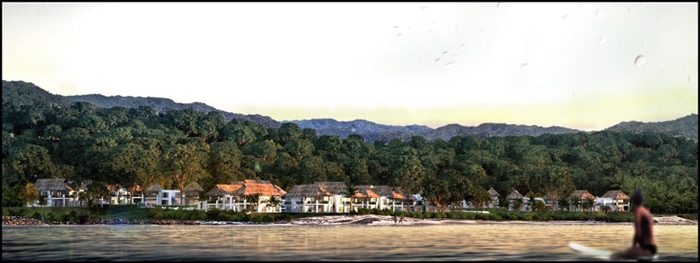
Vargas said that when squatters arrived they were met with violence from police and locals. But when they learned of Fowlie’s legal troubles up north, they continued their efforts, knowing the owner wouldn’t be back to protect his property. Squatters also knew they could make the occupation politically appealing to the local municipality by claiming to take back a drug dealer’s land.
“We knew Danny Fowlie wasn’t going to return because of the prison sentence,” Vargas said. “So the lands here remained abandoned, and we farmers rescued part of the country’s sovereignty by taking it back from drug traffickers, who not only were misusing the land but also developing it with dirty money from drug trafficking,” he said.
The squatters who popped up all over Pavones were a catalyst for Fowlie to put the corporations in the name of Nelson and other partners. In Jeremy Evans’ recent book on Pavones, “The Battle For Paradise,” Nelson says that when Fowlie heard of squatters moving onto his properties, they agreed together to give Nelson power of attorney while Fowlie dealt with his legal problems.
Fowlie denied he ever gave Nelson power of attorney.
“No, it’s a forgery and I never put it in his name,” Fowlie told The Tico Times. “It’s a copy of my signature. I told him if he helped me I’d give him a lot of his choice, a 30-meter beachfront anywhere he wanted. And I didn’t even see him.”
Through Parque Pavones del Pacifico S.A., which lists five directors and has up to 20 shareholders, Fowlie said he would try to reclaim the land he says Nelson and others stole from him.
He said he is confident that any civil cases taken to the Costa Rican Constitutional Chamber of the Supreme Court would award the properties to Parque Pavones after he proves he has the original titles. Fowlie claimed he would win 90 percent of the disputed cases. Even if he wins, because of his age and the normally long judicial process here, it may be that the King’s potential fortune is passed on to the five directors of Parque Pavones.
“Parque Pavones is trying to recover everything that I turned over to them,” he said. “They’ll probably make a lot of money out of it.”
On its website, Parque Pavones cautions potential investors in the area to be wary of buying land from a list of people, who the group says are involved “in numerous court cases currently pending in Costa Rica.” The list includes Alan Nelson, Carlos Lobo, Francisco Gómez, and Sam Claiborn, among 23 others.
“The issue with Danny Fowlie is that I’ve never had any dealings with him and I don’t want to get sucked into having dealings in the press or anywhere else,” Claiborn said before declining to talk on the record any further. Of the more than 20 people contacted for this story, half a dozen refused to be named or even talk at all.
Hans Mora, a legal adviser for Pavones Point, has seen Fowlie’s list, and while he agrees with Martínez that Fowlie has no legal claim left to the land until original titles appear, he said he has a degree of sympathy for him.
“In a way I feel bad for Danny because it was the people he had near him that robbed him of everything,” Mora said. “It was his own workers who did it. It was the very people he gave power to do so.”
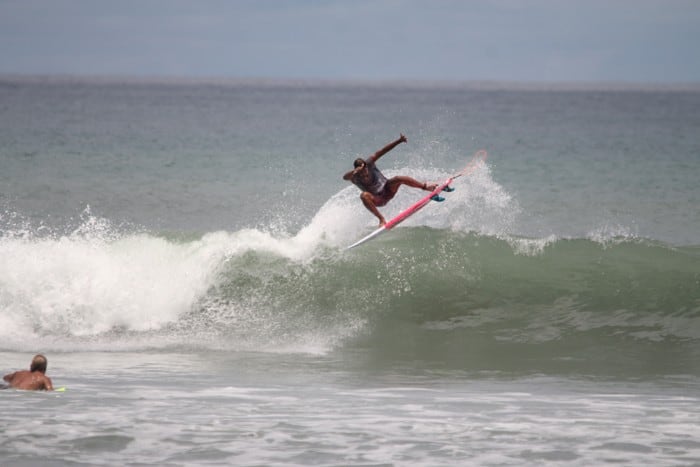
Campaigning for the town
After years of fending off squatters, conducting architectural planning and navigating the bureaucracy to obtain a beachfront construction permit, Claiborn’s Pavones Point managed to get its zoning plan approved.
As part of the zoning agreement with the government, Claiborn told The Tico Times last year that businesses must take the appropriate steps to ensure they benefit the entire community. According to agreements with the Southern Zone Regional Development Board, Claiborn and the Pavones Point team were granted millions of dollars in financing to build an airstrip, a dock and an aqueduct in town. They say these improvements, coinciding with the Pavones Point development, will act as a major economic stimulus for the town by bringing in tourists.
Construction continues on Pavones Point, though Fowlie is critical of the image that some have of the development. He said the project was supposed to create jobs in Pavones, but he claims most of the workers are from Nicaragua. And a promised sewage treatment plant has yet to be built, he says.
Local complaints about sewage treatment and possible environmental damage by the Pavones Point construction have continued in town since the project began. Elisabeth Romano of Mira Olas, a German expatriate who has lived in Pavones for nearly three decades, said the project has a lot of people skeptical about its intentions for the community, reminding some of how Fowlie involved the community while building up Pavones.
“I hope Danny does put pressure on them to get that land back,” she said. “They hadn’t done anything for the community until they were forced to.”
Concerned residents like Romano have said the project doesn’t have a proper sewage maintenance system, alleging that the runoff of waste will go straight towards the wave that brings everyone here in the first place.
Martínez and Claiborn have tried to address concerns by holding multiple meetings with members of the community to reassure them that pollution will be mitigated and that local jobs will be made available once the project is completed. Currently a dozen locals are employed in the construction process, they said.
“It’s the expats that are against it, not the local people,” Martínez said. “Well, to be clear, the locals were against the project, but not anymore.”
He said that when Pavones Point began construction they held meetings with locals. The first meeting was attended by about 40 people. Gradually, fewer people showed up because they were satisfied with the project, he said.
“They saw that we’re not doing anything to negatively affect the community,” he added.
Fowlie, meanwhile, is promising to redo what he did before by boosting the local economy with infrastructure improvements. Despite more than 100 lawsuits, Fowlie said he isn’t coming back to stir up trouble.
“My plan is to live there in peace,” he said. “But I do have to repair the bridges for these guys. I have to do their water system. It’s going to cost me $500,000 to put a sewer treatment system in town because quite a few of them in town are leaking. I want to clean that up for them because they’re not going to ever get the funds to do it, and the municipality isn’t going to help them.”
Some locals in the impoverished community, the ones Fowlie refers to as his family, hope Fowlie can do that and more by bringing jobs to this remote corner of Costa Rica.
“He wants to help out by improving the roads, the bridges and the waste treatment plant,” said mayor Gerardo Mendoza. “I think that in a way it’s good for the municipality, too, because he’s going to be able to arrange everything.”
Others are skeptical. More than 80 residents held a meeting with three of Fowlie’s representatives recently to get a better idea of what he is promising to do for Pavones.
Resident Rosibel González, who said she owns a 1.5-hectare plot of land in Langostino that used to be Fowlie’s, said Fowlie has to be willing to negotiate his claims to the land.
“We hope that what he is offering is an actual concrete plan,” she said. “He says he wants to help the pueblo by building roads and building bridges. We’re afraid that when he arrives he won’t keep his promises and will focus only on getting his land back.”
In gauging the temperament of her neighbors, many of whom also live on property Fowlie once held, González said people likely wouldn’t be willing to give Fowlie back everything he formerly owned.
“We consider it to be ours because of how many years we have been here,” she said. “We are not transients. If he wants to recuperate a portion of it, we are ready to negotiate.”
Felix Rangel Rojas owns a restaurant in La Nicaragua, about a 10 minute drive south from the center of Pavones, which is located on land Fowlie originally owned. On a lazy February morning, he sat drinking beers with friends as they whistled to women passing by on the dirt road, calling, “Venga, mami, venga.”
When asked if he was worried that Fowlie would want to take back this property overlooking the beach, he scoffed and said Fowlie can’t expect to snap his fingers and have everyone in town bow to his wishes.
“It’s like leaving your wife behind and coming back 30 years later and expecting to get her back,” he said. “Well now she’s already got nine kids with someone else. She’s not yours anymore.”
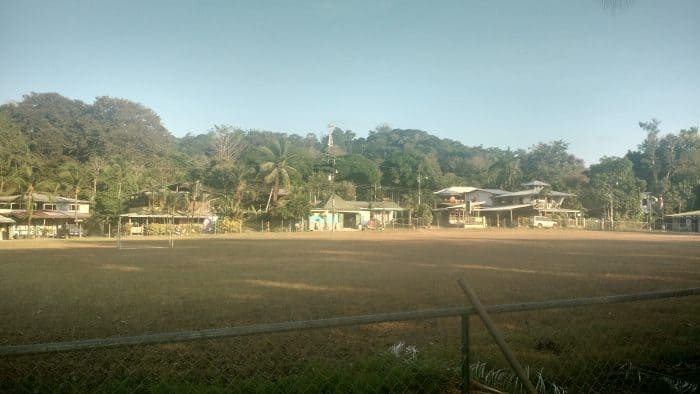
The family
The Pacific turns copper-colored as the sun begins to fall. Only the long wave, rolling with a trim of silver and blue, can avoid the temporary glare that precedes darkness. During the land wars, it was bonfires and gunshots that lit up the night in Pavones.
A U.S. expat who refused to go on record and has been living in the area since Fowlie first built up Pavones offered maybe the best four-word summary for this place with a traditional saying: “Pueblo chico, infierno grande” – “Small town, big hell.”
He claims to have been in charge of the accounting books at Rancho del Mar, Fowlie’s principal property. He said he saw firsthand how Fowlie’s former partners used the powers of the corporations to take possession of the properties while Fowlie was in prison.
“Legally it was legit,” he said. “Morally it was completely [expletive].”
Though Fowlie won’t admit it, perhaps the only two people who didn’t immediately turn on him were Nelson and Lobo.
The latter was in charge of protecting the properties and acquiring weapons to fend off intruders, said Vargas, the former squatter. And Lobo’s loyalty drove him to where he sits now, alone and penniless on a coastal property littered with damaged goods.
“He was against the people precisely because he was supporting Fowlie to the death and he lost everything, including his family, who got tired of him going crazy. And now he’s all alone because of it,” Vargas said. Although they were on opposite sides of the squatter wars, Vargas said after all these years the two have been able to agree that maybe none of this was worth fighting for.
“Now we’re friends and we can have a drink together because he understands that it wasn’t worth it to look over these lands for that cabrón Fowlie,” Vargas said.
Both sides seem to think it would be better if the land conflicts were a thing of the past. That’s why Lobo, who wears the scars of the long war on his exhausted face, said it might be time for him to move on, even after all that effort to keep Fowlie’s property intact.
“Maybe it’s just better that it’s all sold to the state,” Lobo said.
Despite all the lawsuits against former friends and business partners, Fowlie said he does not want to wage a war on the town. When he returned for a few weeks in January, he rented an apartment between the Pavones Point development and the land where the cantina was that Chico Gómez took over before selling it to Claiborn.
There sat the old King, stuck in between his former properties like a prisoner in the dungeon of the castle he created. He slept next to the soccer field he had built and the road that he had paved and the trees that he had planted. None of it his now.
Someone told him there were people in town who were afraid because he had returned. Fowlie said he couldn’t understand why, and that all he wants to do is help. “I don’t want to fight with the people,” Fowlie said. “Most of them are my family.”
***
Contact Michael Krumholtz at mkrumholtz@ticotimes.net

